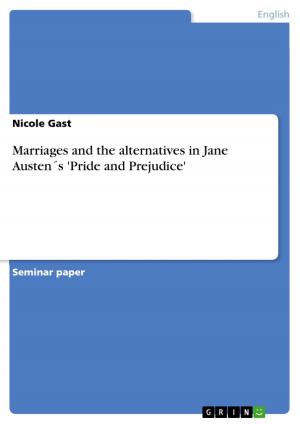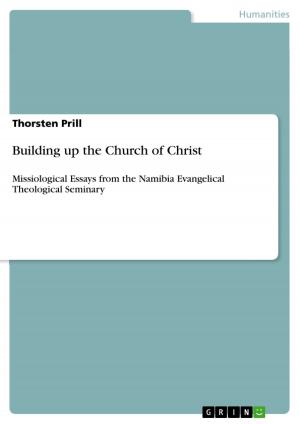| Author: | Olga Kuzin | ISBN: | 9783638624527 |
| Publisher: | GRIN Publishing | Publication: | February 24, 2007 |
| Imprint: | GRIN Publishing | Language: | English |
| Author: | Olga Kuzin |
| ISBN: | 9783638624527 |
| Publisher: | GRIN Publishing |
| Publication: | February 24, 2007 |
| Imprint: | GRIN Publishing |
| Language: | English |
Seminar paper from the year 2007 in the subject English Language and Literature Studies - Linguistics, grade: 2,3, Justus-Liebig-University Giessen (Institut für Anglistik), course: 'Corpus Linguistics and the History of English', 13 entries in the bibliography, language: English, abstract: Sex differences have always been a subject of interest for human beings. So, such interest in language is not an exception. However, linguists prefer the term gender rather than 'sex' because sex has to do with biological distinction; it is 'a matter of genes, gonads and hormones' (Talbot 1998: 7). The term gender was also chosen as a neutral, an indiscriminating one (see Nevalainen 2003: 110, Curzan 2004). In contrast to the term sex 'gender' refers to a linguistic construct on the one side and to the social construct on the other side. Gender as a linguistic construct relates to a gender system of language which is represented by e.g. the personal pronouns he, she, it or lexical items that 'refer to men and women, as well as girls and boys' and which 'retain gender semantically in a natural gender system' (Curzan 2004). Language as a social construct relates to the roles of males and females in society. The attitudes towards men and women are reflected in the language. Otherwise, we can observe gender differences analysing certain language patterns. It is assumed that language not only reflects gender division, but also creates and sustains it (Coates 1993: 4). In this paper I will be looking primarily at the impact of gender as a social variable on the English language. I will analyse the language change in the past, namely, in the Late Middle and the Early Modern English periods with help of the historical corpora. The paper should answer the question how the social variables such as gender together with social rank or genre cause change of the linguistic variables such as grammatical constructions from a diachronic point of view. The concept of a historical corpus and the historical background will be explained in order to understand the base of the investigations. Also, there will be a chapter on the present-day investigation on the language variation. Afterwards we should be able to compare the results from the past and present studies.
Seminar paper from the year 2007 in the subject English Language and Literature Studies - Linguistics, grade: 2,3, Justus-Liebig-University Giessen (Institut für Anglistik), course: 'Corpus Linguistics and the History of English', 13 entries in the bibliography, language: English, abstract: Sex differences have always been a subject of interest for human beings. So, such interest in language is not an exception. However, linguists prefer the term gender rather than 'sex' because sex has to do with biological distinction; it is 'a matter of genes, gonads and hormones' (Talbot 1998: 7). The term gender was also chosen as a neutral, an indiscriminating one (see Nevalainen 2003: 110, Curzan 2004). In contrast to the term sex 'gender' refers to a linguistic construct on the one side and to the social construct on the other side. Gender as a linguistic construct relates to a gender system of language which is represented by e.g. the personal pronouns he, she, it or lexical items that 'refer to men and women, as well as girls and boys' and which 'retain gender semantically in a natural gender system' (Curzan 2004). Language as a social construct relates to the roles of males and females in society. The attitudes towards men and women are reflected in the language. Otherwise, we can observe gender differences analysing certain language patterns. It is assumed that language not only reflects gender division, but also creates and sustains it (Coates 1993: 4). In this paper I will be looking primarily at the impact of gender as a social variable on the English language. I will analyse the language change in the past, namely, in the Late Middle and the Early Modern English periods with help of the historical corpora. The paper should answer the question how the social variables such as gender together with social rank or genre cause change of the linguistic variables such as grammatical constructions from a diachronic point of view. The concept of a historical corpus and the historical background will be explained in order to understand the base of the investigations. Also, there will be a chapter on the present-day investigation on the language variation. Afterwards we should be able to compare the results from the past and present studies.















